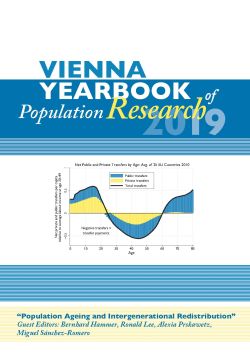
Vienna Yearbook of Population Research 2019, pp. 141-162, 2019/12/02
Special issue on Population ageing and intergenerational redistribution

This article builds on time use micro-data for Italy to analyse the evolution of individuals’ time allocation during the 2002–2014 period, with a gender-specific focus. We are particularly interested in comparing changes that occurred between the years prior to and after the onset of the recent economic crisis.We use regression analysis to measure differences between years in the average use of time of men and women for personal care, education, paid work, unpaid work, and leisure over the considered period(s). In order to gain more insight into gender differences in time use behaviours, we further break down unpaid work and free time into detailed activities. We document a decrease of about two hours per week in female housework coupled with a similar increase in male unpaid work over the entire period. However, while signs of this gender convergence were already evident for women in the years before the recession, we do not find any significant change in male unpaid work between 2002 and 2008. It was only after the onset of the economic crisis, and the consequent losses in paid work hours, that men started spending more time on housework and family care.